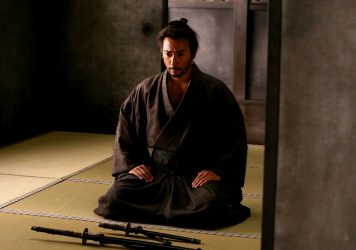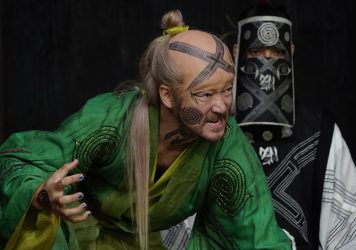
Kazuya Shiraishi polishes off a 60-year-old script for this bloodthirsty samurai epic about a band of criminals recruited to defend a castle from the emperor's army during the Boshin War.
Prolific Japanese screenwriter Kazuo Kasahara – best known for his association with the yakuza films of the 70s and 80s – first wrote the script for 11 Rebels some 60 years ago, focusing on the Japanese Civil War of 1868-69 (The Boshin War) in which the military government were challenged by a coalition of forces siding with the emperor. It’s a period of Japanese history which has proven generally ripe for artistic interpretation, of which Edward Zwick’s The Last Samurai is likely to be most Westerners’ point of entry. Some 22 years after Kasahara’s death, Kazuya Shiraishi – himself a Japanese crime filmmaker – has inherited the 11 Rebels script, and brought the samurai story to life in suitably bloody fashion.
Yet it’s not the samurai who are the heart of this rousing action ensemble. Instead, it’s a “suicide squad” of 10 convicts, who are given the chance to earn their freedom by defending a local fort for the Shinbata samurai. Among their number are a mysterious elderly man, a female arsonist, a lecherous monk, a mass murderer, a card sharp, an aspiring doctor who tried to run away to Russia, and a man whose only crime was being “too handsome” (thereby leading to an affair with a samurai’s wife) but the focus of the action is Masa (Yamada Takayuki), a heavily tattooed labourer who was sentenced to death for murdering the samurai who raped his wife. There’s also the matter of Noro (Takara Sakumoto), who has an intellectual disability and claims to be Masa’s little brother despite Masa’s insistence they are not related. Noro idolises Masa, who has little time for him – he also has no interest in helping the Shinbata and only wishes to get back to his wife, leading to tensions between him and the rest of the group as it is revealed if one of them deserts, they will all be denied their pardon.
Backstory and character development are kept at a minimum, instead making way for plenty of fighting, explosions and gory special effects. The fight choreography is impressive if not a little repetitive, but the special effects team have really pulled out all the stops. Nary a swordfight goes by without someone losing a limb or having a few holes put in them, and the squib budget along for 11 Rebels must have been impressive. Shiraishi does seem keen to emphasise the brutality of war, which seems notable considering the common misconception of the Boshin War as a “bloodless revolution”. It’s certainly not for the faint of heart, but there’s an almost cartoonish level of gore at times, particularly once Noro’s affinity for creating explosives is discovered.
It’s unclear how much work – if any – Shiraishi did to modernise Kasahra’s script, but certainly some of it seems outdated. The treatment of Noro’s disability and the paltry roles given to the film’s few female characters are evidence that there was absolutely room for a fresh take on the samurai genre, and at times 11 Rebels does feel old-fashioned in its sensibilities. It could also deal with a swift chop in the edit suite too, rolling in at 2 and a half hours and struggling to keep up. Despite the thin characterisations of its motley crew and constant toing and froing between the fort and the local seat of power where much scheming is taking place, 11 Rebels does satisfy a certain appetite for destruction, ending on a pleasingly downer note which runs antithetical to any lingering myths about the honour of the samurai warrior.
Published 29 Oct 2024

Takashi Miike follows up his blood-pumping samurai blitzkrieg 13 Assassins with this talky and tiresome period drama.

By Anton Bitel
A ronin with lofty ambitions tells a white lie that quickly spirals out of control in this riotous samurai flick.

At the revamped Tokyo International Film Festival, the spotlight shone brightly on upcoming Japanese artistic voices.